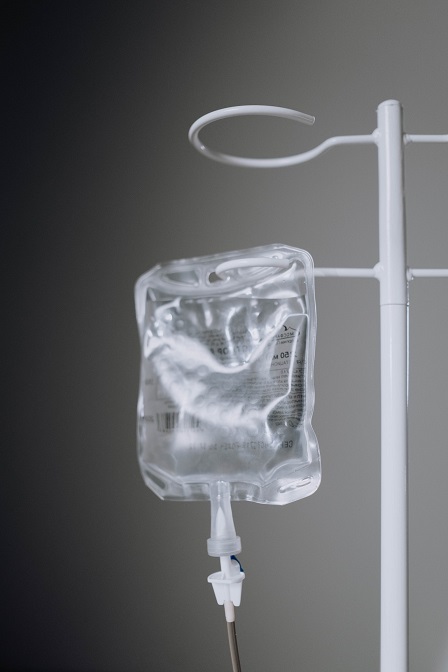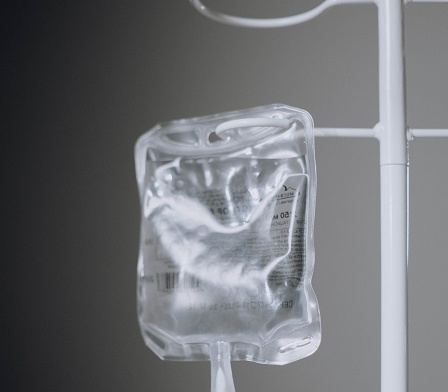Hydrogen peroxide IV therapy is an alternative treatment involving slowly infusing a diluted hydrogen peroxide solution into a vein. Proponents say it reduces infection and eases pain or fatigue by increasing tissue oxygen. But, the therapy has limited scientific backing and carries some risks.
How Does Hydrogen Peroxide IV Therapy Work?
Hydrogen peroxide IV therapy is based on the theory that the hydrogen peroxide breaks down into water and oxygen, which increases oxygen in the blood. Supporters call this “oxidative therapy.” The idea is that it mimics how the immune system uses hydrogen peroxide to fight pathogens.
Some alternative medicine practitioners suggest that this intravenous H₂O₂ infusion can help cleanse the blood of toxins, improve circulation, kill infectious agents, and target cancer cells (though this claim is contested).
The infusion usually contains a small concentration of H₂O₂, usually 0.03% diluted in a carrier like 5% dextrose water. Most sessions occur once or twice a week over a span of several weeks.
Sounds promising, right? The actual biochemical interactions involved here are much more complex than that. The enzyme catalase breaks down the hydrogen peroxide quickly, so it can’t circulate the whole system for very long.
What Conditions Is Hydrogen Peroxide IV Therapy Used For?
Alternative clinics market bio-oxidative therapy for conditions like:
- Chronic pain
- Persistent infections
- Autoimmune disorders
- Interstitial cystitis
- Lyme disease
- Chronic fatigue syndrome
- Cancer (controversially)
- Circulatory issues
There’s some circumstantial evidence for these, but they lack actual scientific support.
What Are the Claimed Benefits of Hydrogen Peroxide IV Therapy?
Proponents of intravenous hydrogen peroxide treatment claim it:
- Enhances tissue oxygenation
- Detoxifies blood
- Reduces chronic inflammation
- Relieves pain and fatigue
- Strengthens immunity
- Improves energy and mental clarity
A study published in Pain Studies and Treatment found that 66% of chronic pain patients who received hydrogen peroxide IV therapy reported moderate to significant symptom improvement.
Patients also reported needing less pain medication and enhanced well-being.
But, it’s important to note that this study was uncontrolled and anecdotal in nature, limiting the strength of its conclusions. It didn’t have the scientific controls in place to conclusively answer questions about placebo effects, natural recovery, and other confounding variables.
What Does the Scientific Evidence Say?
Research is limited. While some observational data shows potential symptom improvement, most rigorous scientific studies either do not exist or haven’t validated these outcomes.
The most frequently cited reports of benefit come from alternative practitioners and patients, not from controlled clinical trials. Studies involving conditions like chronic pain, fatigue, or circulatory issues are often based on small case series or patient surveys without placebo groups or long-term follow-up.
Mainstream medical organizations do not support hydrogen peroxide IV therapy as a validated treatment, citing the lack of reliable data and the potential for serious harm.
What Are the Risks of Hydrogen Peroxide IV Therapy?
Even at low doses, risks of H₂O₂ infusion therapy exist and can be fatal. Side effects include:
- Nausea and vomiting
- Infusion site pain
- Shortness of breath
- Pulmonary edema
- Gas embolism
- Sepsis
- Organ failure
- Death (if it’s not administered properly)
A 2023 forensic case study documented the death of a woman after receiving an improperly prepared hydrogen peroxide infusion. The hydrogen peroxide concentrations far exceeded safe levels, leading to cardiopulmonary failure caused by gas embolism and multi-organ collapse.
This highlights the importance of proper preparation and strict medical oversight. Even trained staff can make critical mistakes when working with reactive compounds like hydrogen peroxide.
Is Hydrogen Peroxide IV Therapy Safe?
While some alternative practitioners claim safety at low doses, mainstream medical opinion strongly advises against intravenous hydrogen peroxide therapy. The FDA does not approve its systemic use and has issued safety warnings related to its infusion.
Hydrogen peroxide can generate oxygen bubbles in the bloodstream when it decomposes. If too many bubbles form, they can obstruct blood flow to the lungs, heart, or brain. These blockages may cause respiratory distress, stroke, or cardiac arrest.
Its rapid breakdown by enzymes like catalase means it does not stay in circulation long enough to deliver sustained effects. This calls into question the biological plausibility of its long-term benefits while emphasizing its short-term risks.
How Hydrogen Peroxide IV Therapy is Administered
The administration process typically follows these steps:
- Medical assessment – A practitioner reviews the patient’s medical history and symptoms
- Solution preparation – A highly diluted hydrogen peroxide solution (0.03%) is prepared with sterile fluids
- IV placement – A vein is accessed, typically in the arm
- Slow infusion – The solution is administered very gradually over 1–2 hours
- Monitoring – Vital signs are checked throughout the procedure
- Post-infusion observation – The patient is monitored for adverse reactions before leaving
This process is simple in theory but requires careful attention to dilution, infusion rate, and patient monitoring to avoid complications.
What Should You Know Before Trying Hydrogen Peroxide IV Therapy?
If you’re considering hydrogen peroxide IV therapy, proceed with caution. Here are several points to think about:
- Consult a licensed medical provider before starting any infusion therapy
- Check the clinic’s protocols for safety, including how they prepare and monitor the concentrations
- Avoid therapy if you have lung, heart, or kidney conditions, which may increase your risk of complications
- Ask about side effect management and emergency protocols in case something goes wrong
- Look for red flags – Be skeptical if the provider makes extravagant health claims or discourages conventional treatments
You should never receive hydrogen peroxide IV therapy from someone without formal medical training. Don’t ever attempt to self-administer these infusions either.
Hydrogen Peroxide IV Therapy FAQs
Is hydrogen peroxide IV therapy FDA-approved?
No. Hydrogen peroxide is not approved by the U.S. Food and Drug Administration for intravenous use. The FDA considers it unsafe for systemic infusion.
How often do patients receive this therapy?
Practitioners usually recommend once or twice weekly sessions for several weeks, though protocols vary. Most regimens involve 5–20 sessions.
Are there any proven medical uses for hydrogen peroxide?
Hydrogen peroxide is approved for topical antiseptic use and as an oral rinse in some concentrations. It is not approved for injection or systemic use.
Can hydrogen peroxide IV therapy treat cancer?
No. There is no credible clinical evidence that IV hydrogen peroxide is effective against cancer. Some practitioners claim benefit, but these claims are not supported by peer-reviewed oncology research.
Should You Try Hydrogen Peroxide IV Therapy?
Hydrogen peroxide IV therapy is one of those alternative healing modalities surrounded by controversy. It does have passionate advocates and a few anecdotal success stories, but the overwhelming scientific consensus is to avoid it.
It’s understandable to consider hydrogen peroxide IV therapy if you’re facing chronic issues or have tried many treatments without results. But you should always prioritize safety over speculation.
There’s not enough clinical evidence and too many documented adverse events for this therapy to be accepted without skepticism.
Resources
Rzepczyk S, Świderski P, Sommerfeld-Klatta K, Tezyk A, Łukasik-Głębocka M, Zielińska-Psuja B, Żaba Z, Żaba C. Causes of Death during the Intravenous Infusion of Dimethylsulphoxide and Hydrogen Peroxide in the Course of Alternative Medicine Therapy. Toxics. 2023; 11(8):652. https://doi.org/10.3390/toxics11080652
Weg, S. (2014) Intravenous Hydrogen Peroxide for Chronic Pain: An Alternative Etiology and Treatment Plan for the Long-Standing Painful States. Pain Studies and Treatment, 2, 73-78. doi: 10.4236/pst.2014.22012.
https://www.mosao2.pauljmoore.com/Article%20-%20H2O2/H2O2_IV_Dr_Farr.pdf




